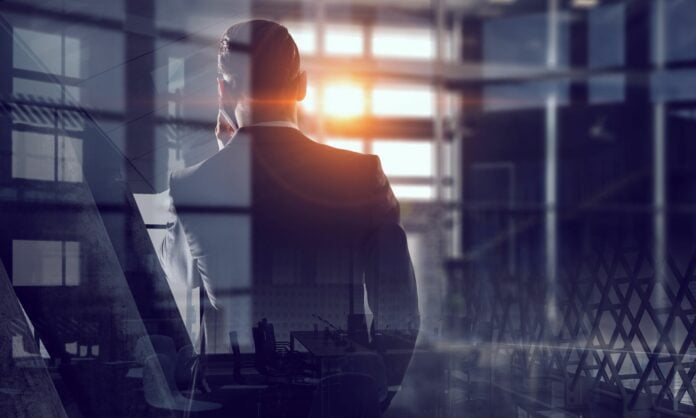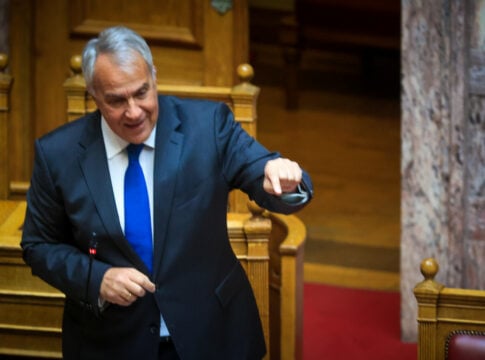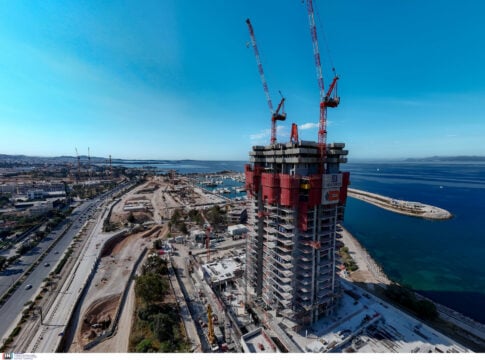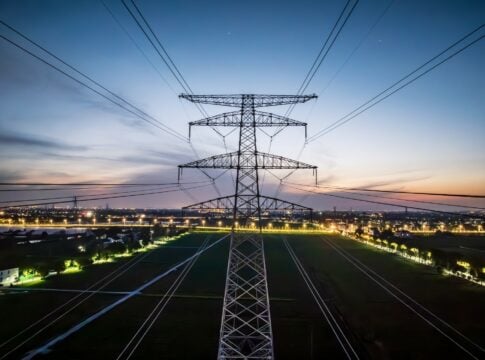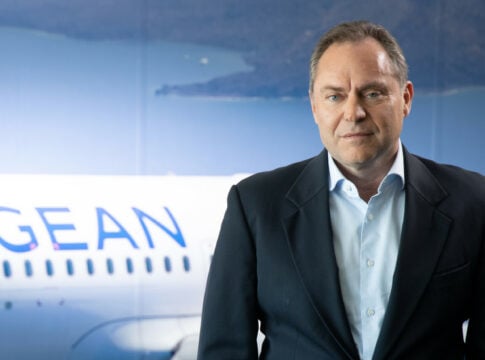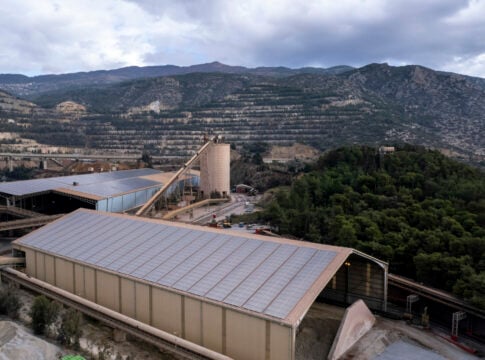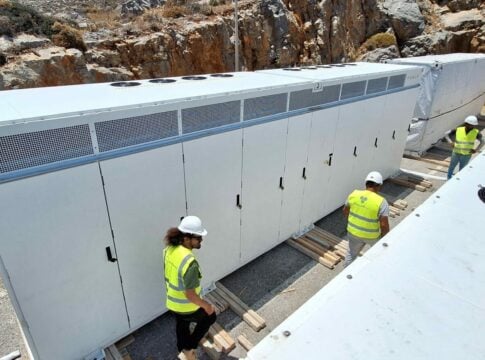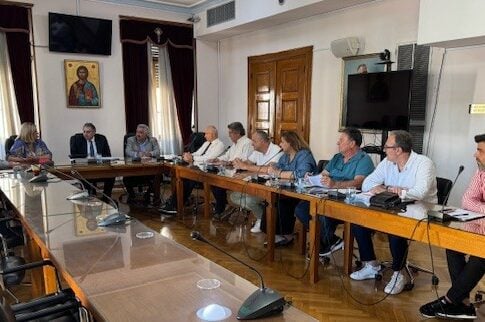There are all kinds of bankers, trying to do their job well. But others see the forest and others only the trees.
Among those who not only see the “forest”, but want it to remain “green and alive” is 54-year-old Dutch Frank Elderson.
Member of the six-member Executive Committee of the European Central Bank (ECB) and vice-president of the ECB’s Supervisory Board, Frank Elderson attracted the interest in this year’s Delphi Economic Forum.
Elderson’s speech was not limited to the short or medium term prospects. After all, climate- and nature-related risks constitute financial risks which trigger concerns among central banks and supervisors.
Frank Elderson’s speech sounded the alarm over the dangers of climate change. About what can happen to our planet by the end of the century. Something that directly concerns Greece.
“The world,” said Frank Elderson, “is now heading for a rise in temperatures well above the Paris Agreement targets – possibly more than 2.9 degrees Celsius above pre-industrial times.”
And for this reason, “the economy must become resistant to the increase in climate and natural risks.
Because any capital stock that does not become resilient to these risks will likely see its economic life shortened significantly. And the investments currently being made to “green” the capital stock may not be immune to this phenomenon.
Flooding, for example, could damage a company’s manufacturing facilities, and as a result affect its ability to repay a loan, in turn leading to a higher credit risk for the bank that issued the loan.
Think about what could happen if our house is built in an area vulnerable to wildfires. Its value could drop, leaving the bank that issued the mortgage with higher risk on its balance sheet.
And these economic risks are not only related to climate change. Last year, the ECB examined more than 4.2 million individual companies accounting for more than 4.2 trillion euros in corporate loans, and came up with the following:
Almost 75% of all bank loans in the eurozone are to companies that depend largely on at least one ecosystem service.
Economy to meet critical climate needs
The structural economic consequences will be profound, according to Elderson, affecting both the supply and demand side of the economy.
That is why the necessary resources should be devoted for the protection of citizens and society from the increase of climatic and natural hazards, such as fires, droughts and floods. This will have significant implications for public finances.
To the extent that the increase in risks can no longer be avoided, the economy will have to cover the critical needs that the European Environment Agency identifies as being at risk.
Frank Elderson also emphasized that beyond meeting these critical needs, the economy will undergo further structural transformation as both preferences and production capabilities change.
A message for Greece
The Dutch banker’s message concerns Greece as well. Tourism is a typical example. Destinations that are popular today may in the future no longer have similar demand or may not even be accessible.
International trade, too, is another example that can be affected by the climate crisis if serious measures are not taken.
It may be forced to reshape itself as existing routes and ports may become unavailable and new ones open. So both our hoteliers and shipowners will have to deal with a new situation. Of course, the banks that finance them will also be affected.
“Therefore, the economy must become resilient to the increase in climate and natural risks. The existing stock of capital – including housing – will have to be upgraded and adapted, with all the structural cost increases this entails,” was one of the key messages sent by Frank Elderson.
“Any capital stock that does not become risk-resistant will likely see its economic life shortened significantly. This will take the form of higher depreciation rates, which entail greater financial risks for anyone with exposure to the capital stock.”
Possible obstacles
In this context, it is crucial for economic policymakers to identify potential obstacles to effective and efficient adjustment, the ECB Executive Board member said and explained:
First, failure to coordinate can lead to misallocation of investment. Some investments may not materialize at all if the private sector does not consider the benefits to society.
Second, structural adjustment in an economy requires the right combination of flexibility, education, and social safety nets to navigate an inclusive and effective adjustment process.
Third, financial obstacles may arise. Increased uncertainty due to potential climate and natural hazards may lead to an increase in risk premiums, which in turn could hold back investment.
And this situation could worsen if it is no longer possible to insure against certain risks – or if it is only possible at prohibitive cost.
Floods
Frank Elderson noted that in areas where problems cannot be solved by private investment, governments may need to step in with increased public investment and safety nets.
This will create significant government contingent liabilities that are not yet adequately reflected in credit ratings or institutional financial governance frameworks.
To realize this, it is enough to think if, for example, the Netherlands floods, how it could keep its AAA rating. And of course, these are not the only risks. Imagine millions of Dutch immigrating to Germany.
Elderson was unfortunately verified a few days later in Dubai, which experienced its own Daniel-type storm.
An unusual torrential rain flooded the desert country and cut it off from the outside world. Hundreds of shops and buildings were destroyed and the inhabitants began to understand what a climate crisis could mean.
“Risks related to climate and nature must be properly assessed,” emphasized Elderson.
Of course, problems in the flow of finance that reduce investment or lead to misallocation can be mitigated by a sound banking system and well-developed capital markets that enhance transparency. In this context, he added, there is an urgent need to complete the banking union and the capital markets union – as the ECB has called for in the past.
Climatic stress tests
Fully aware of the risks, the ECB has already taken very important initiatives such as the climate stress tests that oblige banks to take initiatives in order to become more resilient to climate and natural risks.
Bank leaderships will have to understand the risks and adapt the organizations to the requirements, otherwise they could be judged as inappropriate if they ever fall behind the developments.
This pressure from the ECB is extremely important and is an assurance of the resilience of the banking system.
Frank Elderson’s warnings from Delphi should be heard across the EU, as many are consumed by a short-term strategy with only the European elections in sight. Undoubtedly, central banks and regulators are not, and do not intend to be, climate and nature policy makers.
Governments are responsible for climate and nature policies. But central banks have no choice but to take into account ongoing climate and natural crises to fulfill their mandates in monetary policy and banking supervision.
Listening to Frank Elderson at Delphi, we understood how important it is to have an ECB at the forefront of forward thinking and the green transition.
The ECB in its institutional role looks deeper into the future and tries to respond to the diverse challenges of the decades ahead.


